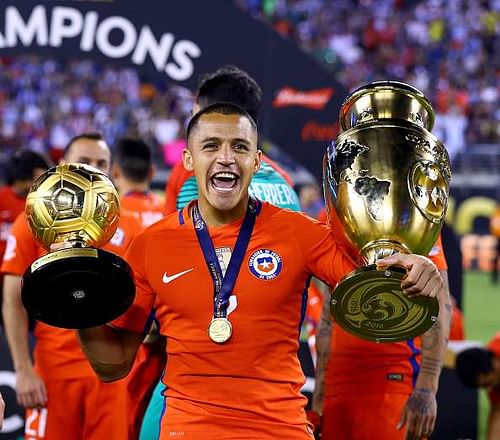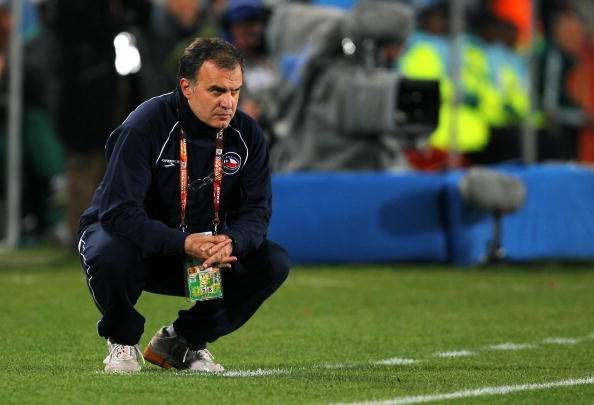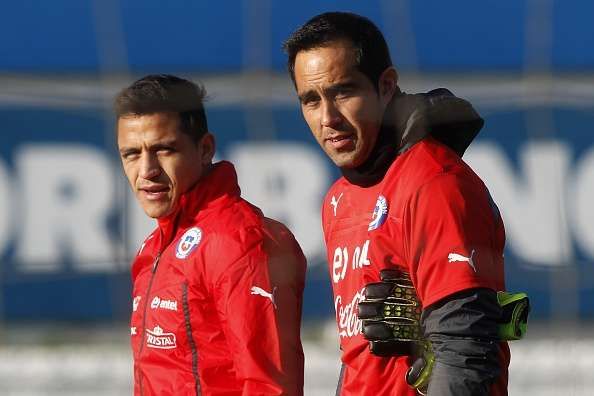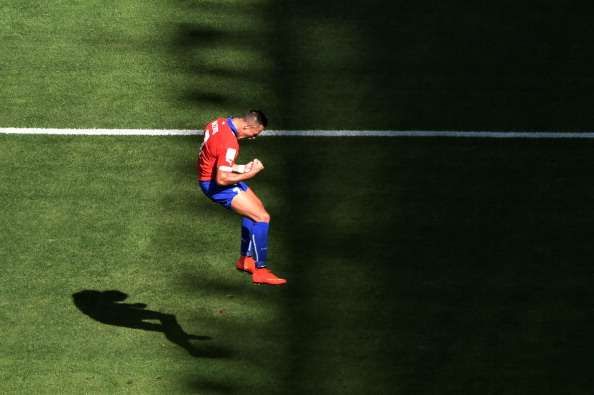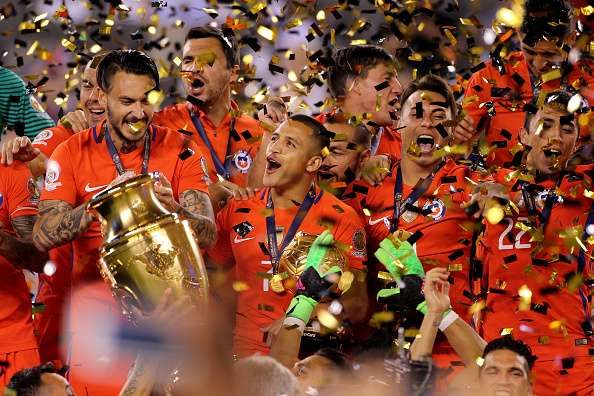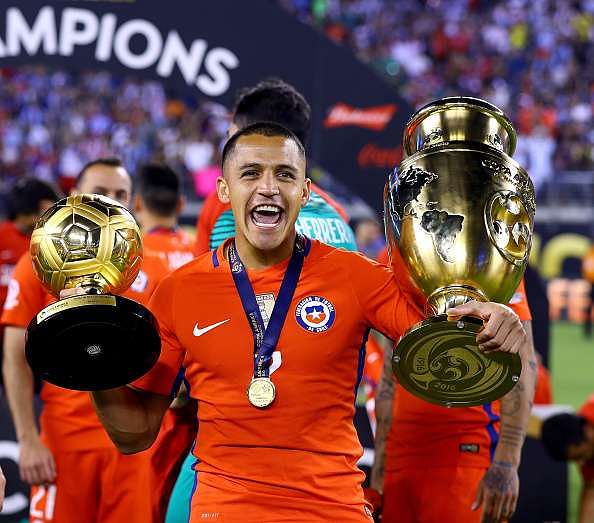
The story of Chile Football's journey to the top
Chile have marked themselves as one of the best international football teams of the decade after a second Copa America trophy in as many years. The golden generation of La Roja are being led by some of the best players in the world at the moment, Arturo Vidal, Eduardo Vargas, Claudio Bravo and Alexis Sanchez, and have not failed to impress.
Player of the Copa America Centenario tournament, Sanchez, has unequivocally been the star that shined the brightest, helping Chile make their way to the top of the global football map.
After failing to qualify for the 2006 FIFA World Cup in Germany, Chile travelled to Venezuela for the 2007 Copa America tournament with former Uruguayan football player Nelson Acosta as the manager of the side. Acosta’s men scraped out of the group stages as one of the best two third-placed teams after a 2-3 win against Ecuador and a draw against Mexico.
The quarter-final was, however, the final nail in Acosta’s coffin as eventual winners Brazil trashed the Chileans 6-1, thanks to a Robinho double.
Soon after the defeat, Acosta resigned as manager of the Chilean national team. Ex-Argentina manager Marcelo Bielsa took charge of the Chilean team in what would prove to be a successful tenure for the Argentine. It was under Bielsa that the core of Chile’s most successful team would be formed.
He promoted the likes of Arturo Vidal, Gary Medel, Mauricio Isla and Alexis into regular players throughout the 2010 FIFA World Cup Qualification Campaign. Claudio Bravo was made the captain after Marcelo Salas’ retirement from the national team.
Soon after the changes brought in by Bielsa, Chile went on to have a historic qualification campaign breaking many records, both positive and negative. The campaign marked Chile’s first qualification loss in a home game against Brazil in nearly 50 years but also their first ever win against Argentina in an official game.
After a fantastic qualifying campaign, Chile made it to the World Cup with 33 points, finishing second just a point behind Brazil. Chile had a decent World Cup too, making it to the round of 16, only to lose 3-0 to Brazil.
Also Read: 10 greatest national teams to win an international competition as the host nation
The period under Marcelo Bielsa was also the coronation of the new Prince of Chilean football, Alexis Sanchez. The forward scored three goals in their qualifying campaign and played every minute of the 2010 FIFA World Cup.
He went on to star as one of the key players for Udinese in the 2010-11 season along with Antonio Di Natale. The duo scored 39 goals between them and his performances attracted interest from Spanish giants F.C. Barcelona.
Meanwhile, the Chilean national team continued their progress, now under Jorge Sampaoli. After Bielsa stepped down as the manager of the national team, Claudio Borghi had a short unsuccessful stint where the national team lost six games in a row.
Sampaoli’s appointment then turned around Chile’s fortunes as the La Roja won three out of their next four games. La Roja’s style of high-energy, pressing football under Marcelo Bielsa was now back with Sampaoli’s appointment.
Chile qualified for the 2014 World Cup in Brazil after finishing third in the qualification tournament. The 2014 World Cup would prove to be vital for Chile as they defeated defending champions Spain to knock them out of the tournament.
Alexis Sanchez was at the heart of every Chile goal as he tormented the opposition’s defence in every game of the tournament. In the round of 16, Chile faced Brazil once again. After the hosts took the lead through David Luiz, Alexis put Chile back on level terms in the 32nd minute.
The game went into extra-time after Chile held on until the 90th minute. Chile managed to silence the Brazillian crowd after Mauricio Pinilla hit the crossbar in the 120th minute of the game, a shot which could have potentially knocked the hosts out of the tournament.
Although Brazil managed to sneak out a win in the penalty shootout, Chile had a tournament to remember. They announced themselves on the World stage as the dark horses of international football.
Alexis Sanchez's career was growing along with Chile's performances. The electric forward had a standout season with Barcelona scoring 19 goals in the league including a mesmerising chip in the El Clasico to give Barca the win.
Also Read: Alexis Sanchez: The squirrel who dared to dream of greatness
His performance attracted interest from many Premier League teams in the summer and after Barcelona opted to bring in Luis Suarez, Sanchez decided to move to Arsenal.
The following two years after the World Cup would prove to be the most decorated for both Alexis Sanchez and Chile. The forward went on to take Premier League by storm, winning Arsenal’s Player of the Year award and also being nominated for the PFA Player of the Season award.
His season ended with the FA Cup triumph in which Alexis scored a goal and assisted one.
After the end of the 2015 season, Alexis and Chile hosted the rest of South America for the Copa America tournament. The hosts topped their group and knocked out defending champions Uruguay in the quarterfinals. They faced favourites Argentina in the finals and with the help of a brilliant defensive performance, they held the Argentines at 0-0 for 120 minutes.
In the penalty shootout Alexis Sanchez scoring the winning kick, sending the home crowd wild to seal what was an incredible journey for both the player and his team.
However, that was not all for the inspirational story of Alexis Sanchez and Chile. After a season plagued with injuries for Arsenal, Alexis travelled to the United States with his national team for the Copa America Centenario tournament.
The Chileans marched into the finals of the tournament, thrashing Mexico 7-0 on their way which was also their best win away from home. The finals went into penalties again after Chile’s defense shut out Lionel Messi and co. for 120 minutes.
Also Read: Copa America 2016: Chile - The forgotten winners of Copa Centenario
Alexis Sanchez was taken off the field after 104 minutes after he suffered an injury. The man who carried Chile into the finals was not able to represent his men in the penalty shootout. His absence did not prove to be costly for Chile as the La Roja sealed the game, winning 4-2 in the penalty shootout.
Alexis Sanchez was adjudged the player of the tournament. Chile’s Golden Boy basked in the glory of the victory with their Golden generation as he put his team on top of the world.
